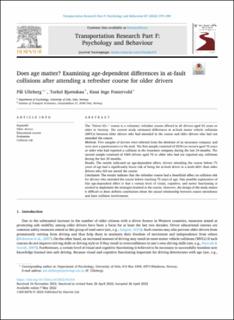| dc.contributor.author | Ulleberg, Pål | |
| dc.contributor.author | Bjørnskau, Torkel | |
| dc.contributor.author | Fostervold, Knut Inge | |
| dc.coverage.spatial | Norway, Oslo | en_US |
| dc.date.accessioned | 2023-06-14T10:12:07Z | |
| dc.date.available | 2023-06-14T10:12:07Z | |
| dc.date.created | 2022-05-11T13:50:25Z | |
| dc.date.issued | 2022-05-07 | |
| dc.identifier.citation | Transportation Research Part F: Traffic Psychology and Behaviour. 2022, 87 379-390. | en_US |
| dc.identifier.issn | 1369-8478 | |
| dc.identifier.uri | https://hdl.handle.net/11250/3071307 | |
| dc.description | Published by Elsevier Ltd. This is an open access article under the CC BY license
(http://creativecommons.org/licenses/by/4.0/). | en_US |
| dc.description.abstract | Abstract: The “Driver 65+” course is a voluntary refresher course offered to all drivers aged 65 years or older in Norway. The current study estimated differences in at-fault motor vehicle collisions (MVCs) between older drivers who had attended in the course and older drivers who had not attended the course. Methods: Two samples of drivers were selected from the database of an insurance company and were sent a questionnaire in the mail. The first sample consisted of 2039 car owners aged 70 years or older who had reported a collision to the insurance company during the last 24 months. The second sample consisted of 1569 drivers aged 70 or older who had not reported any collisions during the last 24 months. Results: The results indicated an age-dependent effect; drivers attending the course before 75 years of age had a significantly lower risk of being the at-fault driver in a multi-MVC than older drivers who did not attend the course. Conclusion: The results indicate that the refresher course had a beneficial effect on collision risk for drivers who attended the course before reaching 75 years of age. One possible explanation of this age-dependent effect is that a certain level of visual, cognitive, and motor functioning is needed to implement the strategies learned in the course. However, the design of the study makes it difficult to draw definite conclusions about the causal relationship between course attendance and later collision involvement. | en_US |
| dc.description.abstract | Does age matter? Examining age-dependent differences in at-fault collisions after attending a refresher course for older drivers | en_US |
| dc.language.iso | eng | en_US |
| dc.publisher | Elsevier Ltd | en_US |
| dc.rights | Navngivelse 4.0 Internasjonal | * |
| dc.rights.uri | http://creativecommons.org/licenses/by/4.0/deed.no | * |
| dc.subject | Older drivers | en_US |
| dc.subject | Educational courses | en_US |
| dc.subject | Evaluation | en_US |
| dc.subject | Collision risk | en_US |
| dc.title | Does age matter? Examining age-dependent differences in at-fault collisions after attending a refresher course for older drivers | en_US |
| dc.title.alternative | Does age matter? Examining age-dependent differences in at-fault collisions after attending a refresher course for older drivers | en_US |
| dc.type | Journal article | en_US |
| dc.type | Peer reviewed | en_US |
| dc.rights.holder | © 2022 The Authors. | en_US |
| dc.description.version | publishedVersion | en_US |
| cristin.ispublished | true | |
| cristin.fulltext | original | |
| cristin.qualitycode | 1 | |
| dc.identifier.doi | 10.1016/j.trf.2022.04.016 | |
| dc.identifier.cristin | 2023607 | |
| dc.source.journal | Transportation Research Part F: Traffic Psychology and Behaviour | en_US |
| dc.source.volume | 87 | en_US |
| dc.source.pagenumber | 379-390 | en_US |
| dc.relation.project | Norges forskningsråd: 187780 | en_US |

